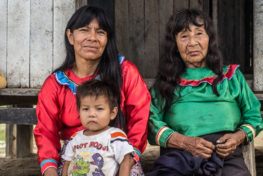Your top Forests News story last week:
Indigenous Women off the charts: How to put equal rights on the map
Not including indigenous women in the creation of maps, risks their land rights, a study finds. Read Forests News International Women’s Day special.
Forests News pick of stories from around the globe:
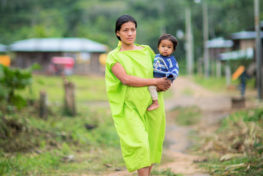
Want to stop climate change? Then fight for women’s rights
As climate change is a ‘powerful threat multiplier,’ existing vulnerabilities will be exacerbated under it, placing women and girls most at risk. According to CNN, droughts and floods have been tied to early marriage and sexual exploitation. What’s more, climate change will increase the burden of tasks that are largely carried out by women in developing countries- such as growing food and collecting water and fuel. CNN draws on research from Project Drawdown that champions girls’ education as a key driver to reduce global populations, before drawing focus to its home turf in the US. The article argues that family planning policies under the Trump administration will raise the number of unwanted pregnancies in the world’s highest emitting country of emissions per head- sending ripple effects for the whole planet. ‘We must see the whole ecosystem, not just the trees, ’ says Katherine Wilkinson, senior writer of Drawdown: The Most Comprehensive Plan Ever Proposed to Reverse Global Warming.

Fighting, uninviting: America’s mostly-white environmental movement
The Guardian holds a mirror to green groups in the US, whose membership is grossly underrepresented by those who are most impacted by pollution and environmental degradation. Though people of colour make up 36% of the population, a 2014 Green 2.0 report showed no more than 12% of those working for environment organizations studied, weren’t white. A 2019 update found diversity to have further declined again in the last few years. Furthermore, an analysis by Intercept showed parts of the country with the highest levels of cancer-inducing pollution were largely populated by minority residents.
According to Solutions Project, of the USD 60 billion in annual foundation funding for causes across the spectrum, 95% is awarded to organizations with white leadership and up to 80% of it is awarded to those led by men.
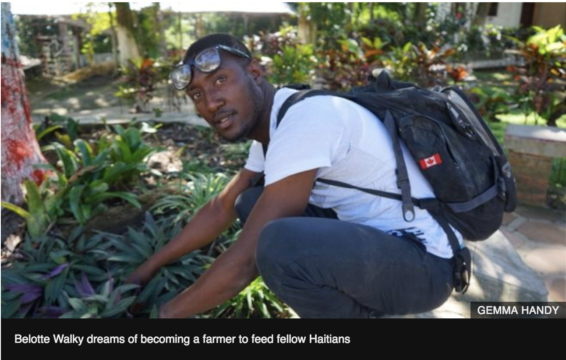
From Easter Island to agroforestry – Students work to reverse the fortune of Haiti
An antidote to an article recently included in Headlines, that dubbed Haiti a ‘modern day Easter Island,’ is a BBC story on North Haiti Christian University (UCNH) students who are studying to turn the tide on Haiti’s misfortunes. Most students are there to forge a career in agronomy, surrounded by trees and wildlife on its 19 acre campus, thanks to a generations-old ban on felling in its grounds. Haiti – one of the world’s poorest and most vulnerable countries to natural disasters – was largely deforested for sugar palm by French colonists in the 17th and 18th centuries. Charcoal production and small-scale agriculture is behind more recent losses. The university balances ecological education with cultural beliefs, using voodoo symbolisms to get to the heart of Haiti’s relationship with its environment.
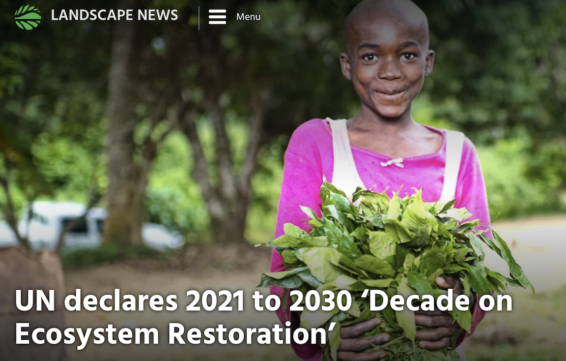
The UN announces a Decade of Ecosystem Restoration
The UN Decade of Ecosystem Restoration 2021-2030 has been announced by the UN General Assembly, Landscape News reports. Scaling up the restoration of degraded landscapes, including wetland and marine ecosystems will now gain momentum to tackle climate change and biodiversity loss. According to the article, world economies and the livelihoods of 3.2 billion people stand to benefit. The top-end estimated cost of land degradation is an eye-watering USD 4.5 trillion each year.

UK chancellor takes a break from Brexit to announce steps to protect biodiversity
Taking a break from Brexit, UK chancellor Philip Hammond is expected to unveil steps to promote biodiversity and protect the planet in his spring statement this week. The Independent reports the chancellor “heard calls from young people” as school pupils continue to walk out of Friday lessons to march for climate change and biodiversity degradation action. Initial responses to the protests by senior members of his party received public backlash, after they publicly denounced the students actions as “truancy.” The protests, inspired by 16 year-old activist, Greta Thunberg, have been snowballing across the globe, with an even bigger one expected to take place in 86 countries this Friday.
Officials say the chancellor’s announcement follows recent figures that underlines biodiversity as an economic driver: the value of the UK’s bees and crop pollinators alone is estimated at GBP 68 million per year. A global review of the economic benefits of biodiversity that ‘enhances ecosystems and promotes prosperity’ will be included in the measures, as will a consultation on how to conserve natural environments in the UK’s overseas territories, ‘from the ice fields of the British Antarctic to the islands of the Caribbean.”
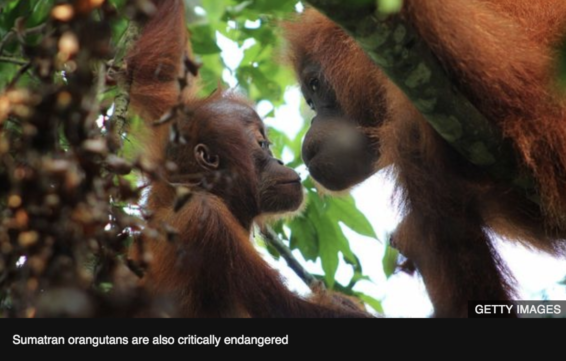
Indonesia dam project sets world’s rarest orangutans on path to extinction, say campaigners
Staying with the BBC, the approval of a hydropower dam in North Sumatra’s Batang Toru forest will put the world’s rarest orangutans on a ‘firm path to extinction,’ say campaigners. The forest is home to an estimated 800 Tapanuli orangutans, who were only discovered as a new species in 2017. The area is also home to Sumatran tigers and agile gibbons.
According to the Jakarta Post, the dam will be built by Chinese state-owned firm Sinohydro and funded by several international banks including the Bank of China. Costing USD 1 billion to build, operators PT North Sumatra Hydro Energy say the dam will provide clean electricity to the North Sumatra region.
Environmental activist group, Walhi says that primary forest is already being cleared with reports of Tapanuli orangutans fleeing the area.
Professor Serge Wich, one of the scientists to have discovered the Tapanuli orangutan said, “There are many other potential areas in Indonesia to build the dam, it is not clear why it has to be here.”

WWF failed to declare indigenous concerns of new national park in €1 million EU funding bid, says BuzzFeed News
A damning investigative report by BuzzFeed News claims it has unearthed evidence that indigenous fears of a new national park were omitted from a EUR 1 million grant application to the European Union. The World Wide Fund for Nature (WWF) promised to seek approval by the indigenous population of Messok Dja in Republic of Congo, as requested by EU funders. Though WWF curtailed EUR 86,000 for this research, it failed to submit concerns raised by indigenous populations that included “repression from eco-guards,” “being forbidden to hunt,” and a “systematic association that they cannot access the forest anymore.” Critics call out WWF’s actions as a “colonial approach” to conservation, while an EU spokesperson notes WWF to have shown a “careful respect” for the process when consulting villagers of the new park. The EU is investigating the report.
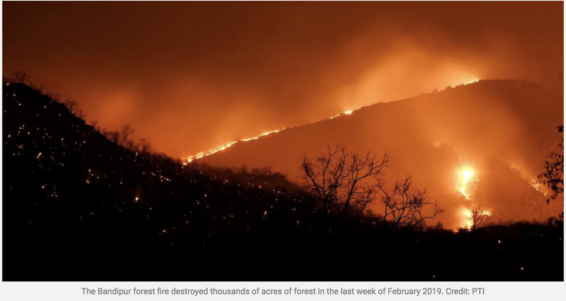
How to stop a wildfire? Start a controlled fire
The Wire exemplars India’s Bandipur-Mudumalai-Wayanad forest- where weeks-old wildfires are just subsiding- to mainstream the indigenous practice of controlled forest fire as a prevention measure. The feature article argues that humans have tactically been burning segments of forests for 50,000 years, with trees and plants having evolved with the practice. While the Adivinasi and Kattunayakans peoples have intricate rules for when fires should burn and how they should be set, a Soligas proverb sums up the practice, “Like a person needs a haircut, a forest needs a fire.”
It was “disbelieving Britons” that tried to suppress the practice in India, as colonial administrators measured the value of the forests by its timber production and not its overall biodiversity.
The Wire draws on new research which highlights a tick-list of factors needed for a wildfire- high temperature, high wind speed, low humidity and a large amount of flammable biomass. Without controlled fire it argues, dead biomass only accumulates further.
Forests News’ video pick of the week:
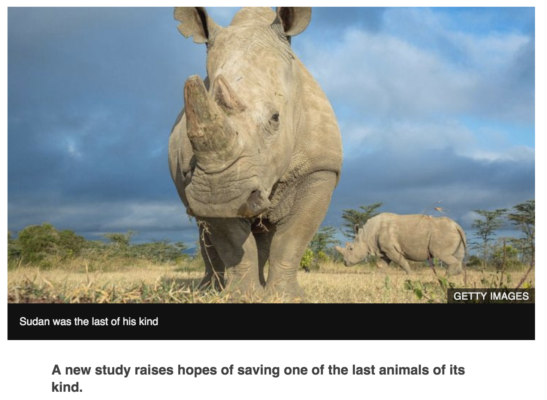
Resurrecting the northern white rhino from extinction
With only two northern white rhinos left on the whole planet- who happen to be two infertile females- hope for the survival of the species largely died with the last male, Sudan, who was poached for his horns earlier this year. However, hope is not lost. Scientists are attempting an ambitious IVF round to see if it can bring the species back from certain extinction. Watch the BBC video.
We want you to share Forests News content, which is licensed under Creative Commons Attribution-NonCommercial-ShareAlike 4.0 International (CC BY-NC-SA 4.0). This means you are free to redistribute our material for non-commercial purposes. All we ask is that you give Forests News appropriate credit and link to the original Forests News content, indicate if changes were made, and distribute your contributions under the same Creative Commons license. You must notify Forests News if you repost, reprint or reuse our materials by contacting forestsnews@cifor-icraf.org.

